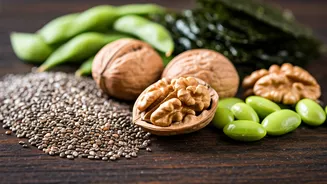Chia Seeds
Chia seeds are a powerhouse of nutrients, including a significant amount of Omega-3 fatty acids. These tiny seeds are versatile and easy to incorporate
into your diet. They are known for their ability to promote heart health. A couple of tablespoons of chia seeds can provide a substantial amount of Omega-3s. You can add them to smoothies, sprinkle them on your cereal, or even use them in baking. Additionally, chia seeds are a great source of fiber and antioxidants, contributing to overall well-being. Consuming chia seeds can help manage cholesterol levels and improve cardiovascular health. They are a convenient and tasty way to boost your Omega-3 intake, making them an excellent choice for a healthy diet. The seeds are also known to improve digestive health. They are an easy addition to meals and snacks, adding a health boost without a significant change to your regular eating habits.
Flax Seeds
Flax seeds are another excellent vegetarian source of Omega-3 fatty acids. These seeds are packed with alpha-linolenic acid (ALA), a type of Omega-3. Ground flax seeds are easier for your body to digest and absorb the nutrients. Add them to your morning oatmeal, yogurt, or even use them as a binder in your cooking. Moreover, flax seeds have a nutty flavor that can enhance the taste of your food. Beyond Omega-3s, flax seeds also provide fiber and lignans, which may help improve heart health and lower cholesterol levels. Regularly incorporating flax seeds into your diet can lead to several health benefits, including reduced risk of heart disease. The fiber content also aids in maintaining a healthy digestive system. They provide a simple yet effective way to increase your Omega-3 consumption. Consuming flax seeds provides a nutritional boost for overall wellness.
Walnuts
Walnuts are a delicious and readily available source of Omega-3 fatty acids, making them a great snack for heart health. These nuts contain ALA, which is beneficial for heart health. Eating a handful of walnuts daily can significantly increase your Omega-3 intake. Walnuts are also rich in antioxidants and other nutrients that promote overall health. You can enjoy them as a snack, add them to your salads, or incorporate them into your baking. Including walnuts in your diet can contribute to reduced inflammation and improved cardiovascular function. The healthy fats in walnuts also support brain health and cognitive function. They are easy to find and offer a simple way to boost your Omega-3 intake while enjoying a tasty snack. Walnuts are a versatile and nutritious addition to any diet.
Hemp Seeds
Hemp seeds are a nutritional powerhouse, offering a good source of Omega-3 fatty acids. These seeds are rich in ALA and also provide a balanced ratio of Omega-6 to Omega-3 fatty acids. You can add hemp seeds to your smoothies, salads, or sprinkle them over your meals. They have a mild, nutty flavor that complements various dishes. Besides Omega-3s, hemp seeds are a complete protein source, providing all nine essential amino acids. Including hemp seeds in your diet supports heart health and overall well-being. They can also help reduce inflammation and improve skin health. Hemp seeds are easy to incorporate into your daily meals, providing a quick boost of essential nutrients. Consuming hemp seeds can contribute to improved overall health. They are also known for promoting healthy skin and hair.
Edamame
Edamame, or young soybeans, is another excellent vegetarian option for obtaining Omega-3 fatty acids. This green vegetable is a popular snack, known for its protein content and nutritional value. Edamame provides a good amount of ALA. You can find it fresh, frozen, or shelled, making it incredibly versatile. It can be steamed, boiled, or added to salads and stir-fries. Beyond Omega-3s, edamame is a good source of fiber, vitamins, and minerals. Eating edamame can contribute to heart health and help regulate cholesterol levels. They are a nutritious and delicious way to increase your Omega-3 intake. Edamame also contributes to feeling full and satisfied, aiding in weight management. It is a good source of iron, contributing to energy levels.
Seaweed
Seaweed, such as nori (used for sushi), is a surprising yet excellent source of Omega-3 fatty acids. Though the amount can vary, seaweed contributes to a healthy diet. Seaweed is a nutrient-dense food, providing various minerals and antioxidants. You can enjoy seaweed in salads, soups, or as a snack. Besides Omega-3s, seaweed is rich in iodine, which is crucial for thyroid function. Consuming seaweed supports overall health and provides essential nutrients. It is a unique and flavorful way to boost your Omega-3 intake. Seaweed can also help regulate blood sugar levels. It is a versatile and easily accessible ingredient in many diets, especially those that include Asian cuisine.
Brussels Sprouts
Brussels sprouts, often overlooked, provide a decent amount of Omega-3 fatty acids, making them a healthy addition to your diet. They are a cruciferous vegetable, known for their health benefits. Brussels sprouts are a good source of ALA, contributing to heart health. You can roast, steam, or stir-fry them. Brussels sprouts are also rich in vitamins, especially vitamin K and vitamin C. Including Brussels sprouts in your diet supports overall health and helps boost your immune system. They offer a unique flavor and texture, enhancing the variety in your diet. Brussels sprouts are high in fiber, aiding in digestion and keeping you full. They are a versatile and accessible vegetable that contributes to a healthy lifestyle.
Spinach
Spinach, a leafy green, offers a modest amount of Omega-3 fatty acids. This versatile vegetable is easy to incorporate into your diet. Spinach contains ALA, contributing to your daily Omega-3 intake. You can add it to salads, smoothies, or cook it in various dishes. Spinach is rich in vitamins, minerals, and antioxidants, promoting overall health. Consuming spinach supports eye health, due to its high levels of antioxidants. Spinach can also help reduce inflammation and improve cardiovascular health. It is a readily available and adaptable ingredient, offering an easy way to boost your Omega-3 intake. Spinach provides essential nutrients for a healthy body.
Soybean Oil
Soybean oil is another source of Omega-3 fatty acids. This oil is versatile and widely used in cooking. Soybean oil is rich in ALA, making it a viable option for those looking to increase their Omega-3 intake. It's often used in various culinary applications, from sautéing to baking. Soybean oil also contains other essential fatty acids. Utilizing soybean oil in your diet is a convenient method to include Omega-3s. It supports various cooking methods, increasing its appeal in many meals. The oil contributes to overall heart health when used in moderation and as part of a balanced diet. It is an easily accessible option for those seeking Omega-3 sources. However, moderation is key when using any cooking oil.
Mustard Seeds
Mustard seeds, often used in Indian cuisine, are a source of Omega-3 fatty acids. These tiny seeds offer a unique nutritional profile. Mustard seeds contain ALA. You can find them in whole seed form or as part of mustard oil. They add a distinct flavor to various dishes. Incorporating mustard seeds into your diet adds a healthy boost and enhances the taste of your meals. Mustard seeds are also rich in minerals and antioxidants. Regular consumption can support heart health and improve overall wellness. These seeds are a practical and flavorful method for increasing Omega-3 intake. They are versatile and can be added to various dishes. Mustard seeds are widely accessible and easily incorporated into a balanced diet.




















